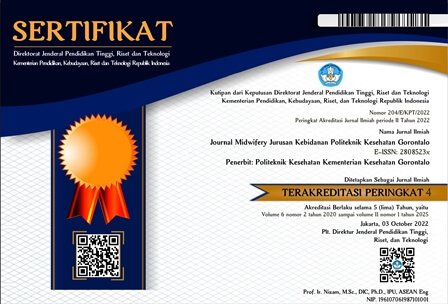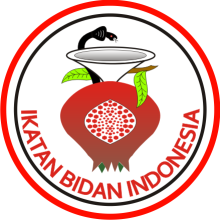Determinan Pemberian ASI Eksklusif
Abstract
Keywords
Full Text:
PDFReferences
Abekah-Nkrumah, G., Antwi, M. Y., Nkrumah, J., & Gbagbo, F. Y. (2020). Examining working mothers’ experience of exclusive breastfeeding in Ghana. International Breastfeeding Journal, 15(1), 1–10. https://doi.org/10.1186/s13006-020-00300-0
Alopa. (2018). Faktor-faktor yang mempengaruhi pemberian ASI Eksklusif pada bayi 7-12 bulan. Poltekkes Kemenkes Gorontalo.
Anggraeni, T. (2016). Hubungan pengetahuan dan pekerjaan ibu dengan pemberian asi eksklusif di posyandu lestari handayani desa jembungan kabupaten boyolali. Jurnal Infokes, 6(2), 47–54.
Asare, B. Y. A., Preko, J. V., Baafi, D., & Dwumfour-Asare, B. (2018). Breastfeeding practices and determinants of exclusive breastfeeding in a cross-sectional study at a child welfare clinic in Tema Manhean, Ghana. International Breastfeeding Journal, 13(1), 1–9. https://doi.org/10.1186/s13006-018-0156-y
Ayalew, T. (2020). Exclusive breastfeeding practice and associated factors among first-time mothers in Bahir Dar city, North West Ethiopia, removed: A community based cross sectional study. Heliyon, 6(9), e04732. https://doi.org/10.1016/j.heliyon.2020.e04732
Buckman, C., Diaz, A. L., Tumin, D., & Bear, K. (2020). Parity and the Association between Maternal Sociodemographic Characteristics and Breastfeeding. Breastfeeding Medicine, 15(7), 443–452. https://doi.org/10.1089/bfm.2019.0284
Chipojola, R., Chiu, H. Y., Huda, M. H., Lin, Y. M., & Kuo, S. Y. (2020). Effectiveness of theory-based educational interventions on breastfeeding self-efficacy and exclusive breastfeeding: A systematic review and meta-analysis. International Journal of Nursing Studies, 109, 103675. https://doi.org/10.1016/j.ijnurstu.2020.103675
Citrakesumasari, Fadhilah, Suriah, & Mesra, R. (2020). Based cultural and religion to education of exclusive breastfeeding for bride. Enfermeria Clinica, 30(Icnph 2019), 127–130. https://doi.org/10.1016/j.enfcli.2019.12.049
Dinas Kesehatan Provinsi Gorontalo. (2017). Data Angka Cakupan ASI Eksklusif Provinsi Gorontalo.
Hackman, N. M., Schaefer, E. W., Beiler, J. S., Rose, C. M., & Paul, I. M. (2015). Breastfeeding outcome comparison by parity. Breastfeeding Medicine, 10(3), 156–162. https://doi.org/10.1089/bfm.2014.0119
Holowko, N., Jones, M., Koupil, I., Tooth, L., & Mishra, G. (2016). High education and increased parity are associated with breast-feeding initiation and duration among Australian women. Public Health Nutrition, 19(14), 2551–2561. https://doi.org/10.1017/S1368980016000367
Kementerian Kesehatan RI, B. P. dan P. K. (n.d.). Laporan Nasional RISKESDAS 2018.
Kitano, N., Nomura, K., Kido, M., Murakami, K., Ohkubo, T., Ueno, M., & Sugimoto, M. (2016). Combined effects of maternal age and parity on successful initiation of exclusive breastfeeding. Preventive Medicine Reports, 3, 121–126. https://doi.org/10.1016/j.pmedr.2015.12.010
Lestari, R. R. (2018). Faktor-Faktor yang Berhubungan dengan Pemberian ASI Ekslusif pada Ibu. Jurnal Obsesi : Jurnal Pendidikan Anak Usia Dini, 2(1), 130. https://doi.org/10.31004/obsesi.v2i1.17
Minggir, P., & Sleman, K. (2017). Hubungan Antara Karakteristik Ibu Dengan Pemberian Asi Eksklusif Di Wilayah Kerja Puskesmas Minggir Kabupaten Sleman the. Jurnl Formil (Forum Ilmiah) KesMas Respati, 2(1), 17–23. http://formilkesmas.respati.ac.id/index.php/formil/article/view/58/31
Mututho, L. N., Kiboi, W. K., & Mucheru, P. K. (2017). Factors associated with exclusive breastfeeding in Kenya: a systematic review. International Journal Of Community Medicine And Public Health, 4(12), 4358. https://doi.org/10.18203/2394-6040.ijcmph20175305
Nkrumah, J. (2017). Maternal work and exclusive breastfeeding practice: A community based cross-sectional study in Efutu Municipal, Ghana. International Breastfeeding Journal, 12(1), 1–9. https://doi.org/10.1186/s13006-017-0100-6
Pitaloka, D. A., Abrory, R., & Pramita, A. D. (2018). Hubungan antara Pengetahuan dan Pendidikan Ibu dengan Pemberian ASI Eksklusif di Desa Kedungrejo Kecamatan Waru Kabupaten Sidoarjo. Amerta Nutrition, 2(3), 265. https://doi.org/10.20473/amnt.v2i3.2018.265-270
Ratnayake, H. E., & Rowel, D. (2018). Prevalence of exclusive breastfeeding and barriers for its continuation up to six months in Kandy district, Sri Lanka. International Breastfeeding Journal, 13(1), 1–8. https://doi.org/10.1186/s13006-018-0180-y
Saeed, O. B., Haile, Z. T., & Chertok, I. A. (2020). Association Between Exclusive Breastfeeding and Infant Health Outcomes in Pakistan. Journal of Pediatric Nursing, 50(xxxx), e62–e68. https://doi.org/10.1016/j.pedn.2019.12.004
Sardar, S., Devgan, A., Shaw, S. C., Mohan, K. R., & Roy, S. (2020). Hypoglycaemia in high-risk neonates on exclusive breastfeeding. Medical Journal Armed Forces India, xxxx. https://doi.org/10.1016/j.mjafi.2020.10.002
Septiani, H., Budi, A., & Karbito. (2017). Faktor-faktor yang Berhubungan dengan Pemberian ASI Eksklusif oleh Ibu Menyusui yang Bekerja Sebagai Tenaga Kesehatan. Aisyah: Jurnal Ilmu Kesehatan, 2(2), 159–174.
Simanungkalit, H. M., Kebidanan, P. S., & Palangkaraya, P. (2018). Status Pekerjaan Dan Pengetahuan Ibu Menyusui Terhadap Pemberian ASI Eksklusif. 16(2), 236–244.
Sipahutar, S., & Namora Lumongga Lubis, F. A. S. (2018). Hubungan Pengetahuan Ibu Paritas dan Peran Petugas Kesehatan di Wilayah Kerja Puskesmas Siborong Tapanuli Utaea. Akrab Juara, 2(3), 88–95.
Zakaria, R. (2015). Faktor-Faktor yang Berhubungan dengan Tindakan Ibu dalam Pemberian ASI Eksklusif di Wilayah Kerja Puskesmas Tilongkabila Kabupaten Bone Bolango Tahun 2014. Jikmu, 5(3), 281–293. https://ejournal.unsrat.ac.id/index.php/jikmu/article/view/7444
DOI: http://dx.doi.org/10.52365/jm.v7i1.321
Article Metrics
 Abstract view : 475 times
Abstract view : 475 timesCopyright (c) 2021 Rahma Dewi Agustini, Sri Wahyuni, Kartin L. Buheli, Ika Suherlin

This work is licensed under a Creative Commons Attribution-ShareAlike 4.0 International License.
| Publisher: Jurusan Kebidanan Politeknik Kesehatan Kementerian Kesehatan Gorontalo Jalan Taman Pendidikan, Kelurahan Moodu, Kecamatan Kota Timur, Gorontalo, Provinsi Gorontalo Tel. (0435)827182, Fax. (0435)827182 email: [email protected] | Support By: |












